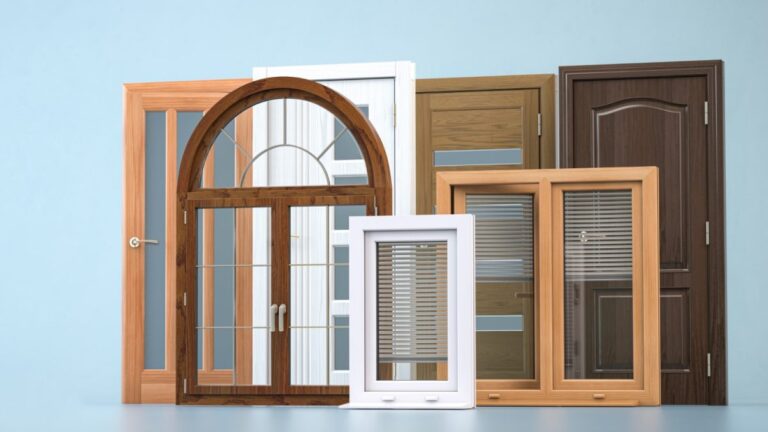When installing windows, understanding their lifespan is key to making the right choice. Windows is crucial in regulating energy efficiency, comfort, and home aesthetics. Over time, different types of windows will experience wear and tear depending on their materials, environmental factors, and maintenance. Window lifespans can vary widely if you’re looking for energy efficiency, durability, or low maintenance. We will explore the lifespan of various window types, including vinyl, wood, aluminum, fiberglass, and composite windows, to help you decide on your home improvement project.
Vinyl Windows
Vinyl windows are popular due to their affordability and low maintenance requirements. Made from polyvinyl chloride (PVC), these windows are resistant to moisture, which helps reduce rot and warping issues. One of the most attractive features of vinyl windows is their longevity, which typically ranges from 20 to 40 years, depending on the quality of installation and the surrounding environment. They hold up well against weather conditions such as rain, snow, and humidity. However, extreme temperatures, particularly intense heat, can lead to vinyl frames warping or becoming brittle over time. The color of vinyl windows may also fade under prolonged exposure to direct sunlight, though modern advancements have minimized this issue. Routine cleaning and minor maintenance can help extend their lifespan, but replacing the window is the best course of action once the material begins to degrade.
Wood Windows
Wood windows offer a timeless and natural look, which makes them a desirable option for homeowners seeking aesthetics and charm. While they provide excellent insulation properties, wood windows are more vulnerable to environmental factors than other types. With proper care, including regular sealing, painting, and staining, wood windows can last between 30 to 50 years. However, wood is prone to moisture absorption, leading to rot, warping, and insect damage if not adequately maintained. Wood windows’ lifespan highly depends on the climate in which they are installed. Humid environments and areas with heavy rainfall will typically shorten the life expectancy of these windows. Regular inspections and diligent upkeep can prevent issues and prolong their longevity. Even though wood windows may require more attention than other materials, their classic appearance and strong insulative properties make them a long-term investment for many.
Aluminum Windows
Aluminum windows are known for their strength and durability. They are highly resistant to weather conditions and do not warp, crack, or swell like wood or vinyl windows. Due to their corrosion-resistant properties, aluminum windows are particularly useful in coastal areas where saltwater can be an issue. On average, the lifespan of aluminum windows ranges between 20 to 30 years, but with regular maintenance, they can last even longer. One of the downsides of aluminum windows is that they are less energy-efficient than other materials. The metal conducts heat and cold easily, increasing energy costs unless outfitted with thermal breaks or insulation improvements. Over time, the protective finish on aluminum windows may wear away, leading to pitting or fading, especially in areas with heavy rainfall or pollution. However, regular cleaning and applying protective coatings can help maintain aluminum windows’ aesthetic and functional quality over time.
Fiberglass Windows
Fiberglass windows are increasingly gaining popularity due to their durability and energy efficiency. As a composite material, fiberglass is known for its ability to withstand extreme weather conditions without warping, rotting, or cracking. On average, fiberglass windows can last anywhere from 30 to 50 years or longer with proper care. One of the major benefits of fiberglass windows is their structural stability. They expand and contract at roughly the same rate as the surrounding glass panes, reducing stress on the window seals and minimizing the risk of air leaks or moisture infiltration. Fiberglass windows also require very little maintenance besides occasional cleaning and inspections. While the initial cost of fiberglass windows may be higher than vinyl or aluminum, their long-term durability, energy efficiency, and low maintenance needs make them a wise investment for homeowners seeking longevity.
Composite Windows
Composite windows combine wood, vinyl, and fiberglass to create a highly durable and energy-efficient product. The combination of different materials provides the strength of wood with the low-maintenance properties of vinyl or fiberglass, offering homeowners the best of both worlds. The lifespan of composite windows generally ranges from 40 to 50 years, depending on the specific materials used and how well they are maintained. Like fiberglass windows, composite windows are resistant to warping, rotting, and fading, making them an excellent choice for long-term performance. They offer superior energy efficiency by effectively insulating against heat and cold, which can lead to lower energy costs over time. The only significant drawback of composite windows is their higher upfront cost than vinyl or aluminum ones. However, the long-term maintenance and energy bills savings often justify the investment. With regular cleaning and occasional inspections, composite windows can remain in excellent condition for decades, making them one of the longest-lasting window options.
Choosing the right window material for your Albuquerque NM home is an important decision that will impact your living space’s comfort and energy efficiency and the overall value of your property. Vinyl windows offer affordability and moderate durability, while wood windows provide a classic aesthetic with proper maintenance. Aluminum windows offer strength but may need added features added features. Fiberglass windows boast impressive longevity and low maintenance needs, while composite windows combine the strengths of various materials to deliver long-term durability and energy savings. Understanding the lifespan of each window type allows homeowners to choose the option that best fits their needs and preferences, ensuring long-lasting performance and satisfaction. By considering the specific environmental factors, material characteristics, and maintenance requirements, homeowners can invest wisely in windows that will serve them well for many years.
